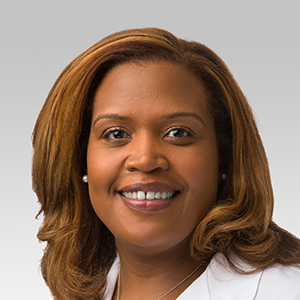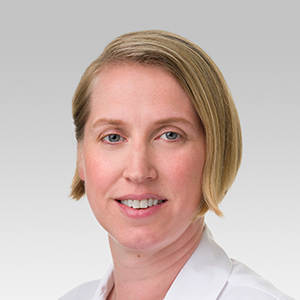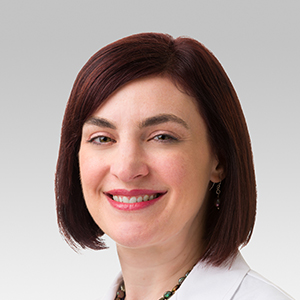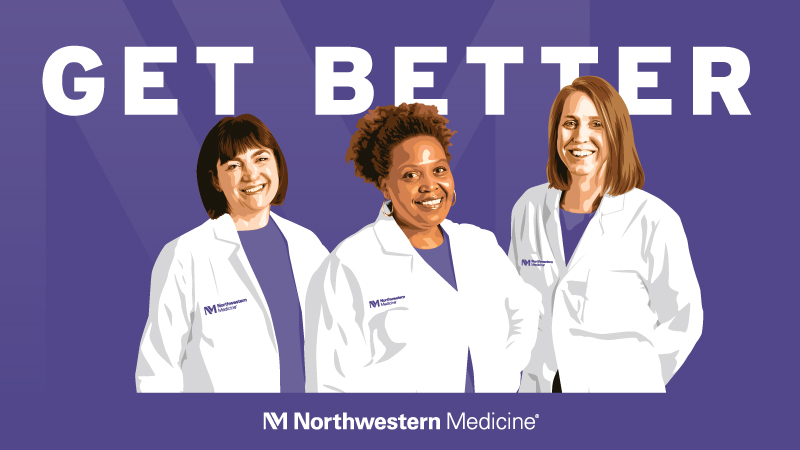SEASON 2 EPISODE 4
Get Started on Your Family [Podcast]
How a Northwestern Medicine Physician Helped Her Best Friend Start a Family
Published June 2023
About this Episode
Fertility specialists dedicate their lives to making it possible for people to bring babies into the world. Here’s the incredible story of how a Northwestern Medicine physician helped her best friend start a family.
Featured Guest Experts
Director of Fertility Preservation, Northwestern Medicine Center for Fertility and Reproductive Medicine
Michelle Goldstein, patient
About the Get Better Podcast
Living a healthier life is a journey with no final destination: You can always get better. Susan Russell, MD, Khalilah Gates, MD, and Michelle Prickett, MD, are three pulmonologists at Northwestern Medicine who help people get better from critical illnesses. They are also lifelong friends and lifelong learners who want to get better from head to toe. These three physicians will learn alongside you as they interview other Northwestern Medicine experts about health and medicine topics meant to help you achieve better health.Listen
Disclaimer: This podcast does not substitute for medical advice from a clinician.
Transcript
Russell [00:00:02] Let's get stronger.
Gates [00:00:04] Healthier.
Prickett [00:00:04] Calmer.
Russell [00:00:05] Smarter.
Gates [00:00:06] Better.
Prickett [00:00:07] Living a healthier life is a journey, not a destination.
Gates [00:00:10] You can always get better.
Prickett [00:00:12] Let's get better together. All right, ladies. So today we are talking about fertility and what are options for family planning and starting families.
Gates [00:00:26] This is a much-needed episode. I think that many, many people have to deal with fertility questions and concerns, and we just don't talk about it and normalize it. I know many people close to me have struggled, and the emotional toll that this takes is lessened if we can just have open and honest conversations about it, and normalize that people often have to get some assistance to start their families.
Russell [00:00:56] I completely agree. I think there's a public perception that fertility is a very natural thing. I think a lot of people struggle with this, and in our current day and age, there's a lot of things available out there that can really help people.
Prickett [00:01:10] I think when I talk to patients of mine, especially with genetic lung disease, about family planning, I always start with, "Do you see yourself as a parent one day? If you do, families can be started in any different ways." And so there's all kinds of different science and ways to start a family. And we hope we can align people with what works best for them.
Gates [00:01:28] Absolutely. I think one of the beautiful parts of this podcast is that we really work hard and are intentional about destigmatizing many different aspects of health care, and this is definitely one of those topics. So ladies, if you're ready, let's talk about fertility.
Russell [00:01:43] Let's get to it.
Prickett [00:01:55] About 10% of people in the United States between the ages of 15 and 44 have difficulty getting or staying pregnant. Thankfully, fertility specialists make it possible for people to bring babies into the world. Today, we are going to hear the incredible story about how one physician helped her best friend become a mom. Let's welcome Dr. Kara Goldman, medical director of Fertility Preservation at Northwestern Medicine Center for Fertility and Reproductive Medicine. And let's also welcome our second guest, a new mom and Dr. Goldman's best friend, Michelle Goldstein. Thank you both for joining us today.
Goldstein [00:02:27] Thank you for having us.
Goldman [00:02:28] Thank you so much for having us.
Prickett [00:02:30] So before we get into this, do you mind just telling us a little bit about your friendship?
Goldman [00:02:34] Yeah. So we've been friends since seventh grade and have been such close friends ever since, there for all of each other's ups and downs, weddings and bachelorette parties and losses and babies and really the whole spectrum of highs and lows of a friendship.
Goldstein [00:02:53] I think probably the biggest thing, you know, in adult life that kept us together is it always is just the same. Right? We understand busy lives, and we could go a while without talking and then we'd talk and see each other and it's like nothing ever passed.
Prickett [00:03:08] I call those the "pick up where you left off" friendships.
Goldman [00:03:12] Yes. And we always joked that she was kind of more a member of my family than I was because she looks so much like my sisters and I don't. And, you know, she was kind of the fourth sister in my family.
Russell [00:03:24] Michelle, tell us about your fertility journey.
Goldstein [00:03:27] I met my husband later than some. I was 32. I got married at 35. Everyone was like, you're not going to want to waste any time. You're going to want to start trying for babies right away. But we waited, you know, maybe nine, 10 months. Wasn't successful. Kara had been living in New York and just oddly was moving back here, got the job at Northwestern, right at the time that I wanted to start fertility. So I was asking her suggestions of where I could go. And she was like, "You could come to me." And it was like a little hard of a decision because that's a little personal for like a one of your best friends to be involved in. But it ended up working out. I, of course, like, feel so lucky and blessed that it did because it ended up that she looked over all of my stuff. She wanted to do my transfers or she wanted to do my ultrasounds when I was pregnant. I was so blessed to have it be that way.
Gates [00:04:23] An awesome journey.
Goldstein [00:04:25] It was. Ups and downs, but an awesome journey and a yes, good ending.
Gates [00:04:30] So we talk about infertility as if it's just one thing. So Dr. Goldman, can you share with us what exactly infertility is?
Goldman [00:04:39] Yeah, absolutely. So infertility, the definition of infertility is "inability to achieve a pregnancy after one year of unprotected intercourse in someone who's under the age of 35" or, "inability to obtain a pregnancy after six months in someone who's over the age of 35." And, you know, there are so many different causes of infertility. We can kind of put them into different categories to make it simple. You know, a third of infertility is male factor, a third of infertility is female factor, and then a third is unexplained. We were to dive into the the various kind of buckets of infertility and think about, within female factor, there's, you know, tubal factor, so someone's fallopian tubes can be blocked. There can be ovulatory dysfunction, so someone just doesn't get regular periods and doesn't ovulate regularly. PCOS is a very common cause of that, and that's something that we see routinely in our practice. Someone can have low ovarian reserve, and so we know that the ovaries age decades before every other organ system in the body. And so someone may just have lower ovarian reserve than someone else, which makes fertility treatments often less successful. And so there's a really wide range of why someone might present with infertility. And we really, you know, take those initial visits are to figure out why someone is having trouble conceiving, to then figure out how we can best tailor the treatment. Unfortunately, Michelle and Mike kind of fell into that one third of unexplained infertility, which is a really just painful diagnosis because it's very hard to feel like we don't have an explanation.
Gates [00:06:10] So, this is for Michelle. Like, can you tell us a little bit about the journey from a physical standpoint and emotional standpoint?
Goldstein [00:06:18] Yes, and I think that this is so important for listeners to hear because these are things that probably you wouldn't think of until you are going through it. Obviously, the journey was long. We started small. We we did some IUIs, the intrauterine insemination. We had a couple losses from IUI. I had a miscarriage at eight weeks that Kara actually found. So that was very emotional in itself. And then I had a biochemical pregnancy. They also consider a miscarriage. And then we started with IVF, then hit COVID. So I had one round of medication. We decided not to go through with an egg retrieval because I wasn't responding that well to the medications. Then we hit COVID, and everything stopped, and we didn't know how long of a wait it would be. Luckily, it wasn't too bad. Only a couple months and then started IVF again. I started having egg retrievals and banking embryos, and I had a 17-week loss in February of 2021. It was a terrible second trimester loss, but eventually then had another egg retrieval, which was my worst egg retrieval yet, numberwise. I got five eggs, which was the least amount I had ever gotten. And then out of that two fertilized, it's not a good number, you know. And so it was a very long five days to see if these two would even last. And they did. And then we decided to implant them. And now I have twins. So it's like the craziest success story with a lot of bumps.
Russell [00:07:59] Wow. That is quite some journey. Dr. Goldman, is that kind of the typical time?
Goldman [00:08:05] In terms of the experience of unsuccessful intrauterine insemination and then miscarriages and late losses, and, you know, all of this, unfortunately, can happen as someone is going through these treatments. Unfortunately, a lot of it seemed to happen to Michelle. So things like a 17-week loss, that's not typical. That was crushing, but the kind of length of time of having to do multiple IUI cycles and multiple IVF cycles, unfortunately, that is more common than we wish it were. And so, yes, the timeframe is in many ways typical, but part of it was we were also trying to plan for two children, you know, trying to have embryos frozen so that they could reach that goal of a second baby, because the reality is, if you're 37 or 38 when you have your first child, and then you're 40 or 41 for your second, you may really struggle to conceive that second child. So we were really trying to mitigate that risk of secondary infertility.
Prickett [00:09:02] Do you mind kind of giving us clarification on what IUI is and what IVF is and what it might mean to a patient thinking about these options?
Goldman [00:09:09] There is quite a bit of alphabet soup in our field, and we use a lot of abbreviations. The first kind of level of treatment that we can pursue is something called intrauterine insemination. So if someone comes in with unexplained infertility, we'll often try what's called controlled ovarian hyperstimulation, where we administer a drug to get someone to ovulate more eggs. So something like Clomid or Letrozole may be familiar to people listening. And then in addition to that, we perform an intrauterine insemination, IUI. Layman's term would be, you know, artificial insemination. But really it's a catheter that is injected into the uterus and we inject sperm through the catheter and make sure that we're timing it at the exact right point in the cycle where someone is about to ovulate. So they're essentially, you know, they will have multiple eggs exposed to sperm. And the sperm is basically brought closer to the fallopian tubes to facilitate fertilization. The typical escalation of care is that if someone has unexplained infertility, we recommend three cycles of Clomid with IUI, and when that doesn't work, the data really shows that the likelihood of it working with additional cycles is, it's just less effective. And so we often at that point move on to in vitro fertilization if we can. And so in vitro fertilization is IVF, and that means, quite literally, fertilization in vitro, which means in a laboratory. And so we stimulate the ovaries, try to get multiple follicles that contain eggs to grow. We retrieve those eggs in a minor surgical procedure under anesthesia. We basically have a little needle that goes into the ovary. We suction all the fluid out and get the follicles in the eggs, and then those eggs are fertilized in the laboratory with sperm. And that's either with a patient's sperm, donor sperm, whatever the circumstances may be. And then those embryos are then followed in the laboratory. So essentially, we see if the embryos, the eggs, fertilized. The next day we see that they're early embryos. We grow them to the day five or day six stage when they're called blastocysts. And at that point, we either put that embryo back in the uterus, or we can test the embryo for chromosomes. And so in many cases, we'll do something called pre-implantation genetic testing, PGT, and that is to test for chromosomes. So we know that we are eventually putting a healthy embryo in the uterus that has normal chromosomes, 46xx female, 46xy male, or we can just kind of put the embryo in without testing. And Michelle has, you know, her care was in, we kind of explored all of this. She unfortunately had to experience kind of all aspects of what we do. So Clomid with intrauterine insemination, IVF with a fresh embryo transfer, IVF with PGT, with genetic testing. So the whole gamut.
Gates [00:11:57] Because I hear Michelle speaking of kind of this up and down roller coaster. So is there anything built into the program to help couples through that?
Goldman [00:12:06] There is, and it's very unique to Northwestern. We have two health psychologists who, this is their job, day in and day out, to help patients cope with the stress of infertility. And they're available from the moment a patient establishes care in the clinic through pregnancy loss, through all of the failures and the victories. And so we are very, very fortunate to have that at Northwestern. And they are phenomenal health psychologists and really add a lot to the patient experience.
Gates [00:12:36] So if we're concerned about infertility issues, what should we do? Like, what are some of like the first steps?
Goldman [00:12:42] So I think one of the most important things is to talk about it, because I think this is something that is so private for so many people. And when it feels like something you can't talk about and then time goes on and on, and for some people, then that means a really delayed evaluation. And so I think talking about it to your general obstetrician, your OB-GYN, just to make sure that they know what your goals are so that, you know, if you know you want to have a certain number of children that you are kind of staying on top of it and being proactive, and then early referral to reproductive endocrinology. So this is what we do day in and day out, and it's so critical to kind of have a set of eyes on your labs and your results and your ultrasounds so that we understand what's going on so we can address the problem and fix it and get to babies.
Russell [00:13:28] And I was surprised to know that a lot of just general internal medicine comes into play as well. Like, I have a friend who had issues with her thyroid function and that actually ended up being the cause of her infertility. So it seems like even just talking with your primary care doctor, even before you're ready to actually get pregnant, might be helpful in optimizing your regular general care.
Goldman [00:13:50] In so many ways, we think about the menstrual cycle as almost another vital sign, because it's a reflection of, in some ways, your overall health. If you're not ovulating regularly and getting regular periods, it absolutely could be an indication of something going on with your thyroid or your prolactin or a sign that there is another medical issue going on. We have to think about this early and often to make sure that we don't lose the opportunity to get pregnant.
Russell [00:14:14] Can you just talk briefly about the male journey and what sort of things might be challenges or things that people who are male should expect?
Goldman [00:14:24] In the case of a male partner who needs to produce samples, you know, it is incredibly uncomfortable because, you know, they're ejaculating on demand. And so in many cases, that means ejaculating in our Andrology collection rooms or collecting a sample at home and, you know, bringing that sample in. But unfortunately, because this feels so kind of artificial and the timing is, you know, we're ready now, please give us a sample today. There can be some ejaculatory dysfunction and erectile dysfunction that is uncovered in the process because it's just so stress-inducing. And so that's another kind of advantage of having our psychologists on board, because this is something that they help couples through. And we have fantastic reproductive urologists that we work with. And so they're a very important part of this process as well in terms of identifying male factor infertility, but then also helping with some of these other issues that come about, like ejaculatory dysfunction, erectile dysfunction.
Russell [00:15:21] Can you, Dr. Goldman, talk a little bit about how common it is and for people who are trying to get pregnant, if they have a miscarriage, does that mean that they are infertile or that they have higher risk of infertility?
Goldman [00:15:34] Numbers are somewhere around one in eight couples will experience infertility. Depending on the data you're looking at, it could be even as as common as one in six couples. A lot of people will experience this in their lifetime. In terms of miscarriage, having one miscarriage certainly doesn't suggest that you're going to be at risk for future miscarriages, but it depends on the reason for the miscarriage. So when someone has a loss, we always want to figure out, is there some explanation for it? And so we can do testing on the fetal products to find out, was it a chromosome abnormality, which is the most common reason for miscarriage. And if that's the case, then, you know, we know that that happens more often as we age. And so, as women get older, our eggs become less efficient. So we have fewer eggs, more of them are are going to produce abnormal pregnancies. And so that certainly can increase the chance of a future miscarriage if the woman is just at an advanced reproductive age. But there are so many other causes of miscarriage as well. You know, certainly all of these things are very common, unfortunately. Infertility, miscarriage, we often don't talk about them as much as we should to normalize it. But again, normalizing it and talking about it doesn't make it any less painful. But it is sometimes helpful to know that other people are going through it.
Prickett [00:16:47] I just have one more question for Dr. Goldman is, how how frequently do you have good outcomes like this?
Goldman [00:16:52] So much depends on a person's underlying diagnosis and what brought them to care in the first place. In someone who goes through in vitro fertilization, if they have a reasonable ovarian reserve, meaning if we can retrieve eggs, if their partner or donor or whatever the circumstances, has sperm, and we can create embryos, then often it's a matter of persistence in terms of creating an embryo, identifying a healthy embryo, and in someone who is going through in vitro fertilization and then PGT, the genetic testing of the embryo, once we have a tested healthy embryo, each normal embryo should give us about a 60 to 70% chance of a baby. So those are excellent odds once you get to that stage. But the challenge that most people find is that they're limited by the efficiency of IVF, and that is limited by the efficiency of their ovaries, because if you only get five eggs in a cycle, as Michelle mentioned, you know, we expect 80% of those to fertilize normally or 70% to fertilize normally, and 50 or 40% of those will make it to the final blastocyst stage. So there's a lot of attrition. So from whatever number of eggs someone starts with, those numbers will unfortunately whittle down. And then age really predicts the likelihood of getting that normal embryo. So once you get to that healthy embryo, the odds are excellent. But it's a matter of all of the ups and downs and challenges of getting to kind of a good number of embryos to even be tested for biopsy.
Prickett [00:18:23] I think we've had such a great discussion. And as we wrap up here, I have two final questions. For you, Michelle, tell us about how it feels to have your two beautiful babies, and how you have been transitioning into a new mom.
Goldstein [00:18:37] Short answer: amazing. Surreal. So surreal. There are 10 months already. I'm planning their birthday party. I feel like I was just giving birth. I look at them in disbelief. I really, every day I do. And I heard this when I was going through these struggles, and it is true, especially with twins, you're human, you're tired, you get frustrated, you're overwhelmed. But there is a level of just appreciation after everything I've gone through that makes it easier. The nights that I'm up, I'm like, OK, but I'm so grateful for them that it makes it a little easier to handle. So, it's been amazing and I am forever grateful to Kara. She didn't give up on me.
Goldman [00:19:25] And I just have to say, I mean, Michelle, like the moment I met those girls, I, I mean, you know, I bawled like a baby. Like, there's nothing like seeing you as a mom. I've known you through all of these stages of life and knew that you were destined to be an amazing mom. Like I've never seen you so in your element as you are now as a mom. And I rarely get to see that with my patients. I never get to see kind of the the year after they're born. I see maybe I'll get a baby picture and and it's just like, so meaningful to know that they've built their family and they're glowing with their new family. But I don't get to see the progression. And so to see you and Mike just be the most amazing parents to these beautiful girls and to watch them grow, it is the privilege of a lifetime.
Russell [00:20:12] Well, thank you so much, Michelle and Dr. Goldman , for joining us and sharing the story of friendship, hope, babies and the impact of fertility treatment.
Goldman [00:20:22] Thank you so much for having us.
Goldman [00:20:24] Thank you for having us.
Russell [00:20:29] Thanks for listening to Get Better.
Gates [00:20:31] We hope you leave this podcast better than when you started.
Prickett [00:20:35] For more information, visit nm.org/healthbeat.







